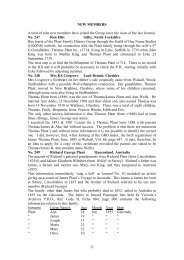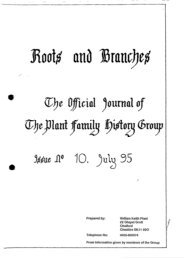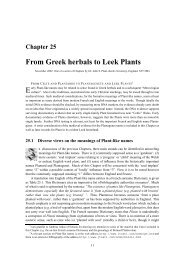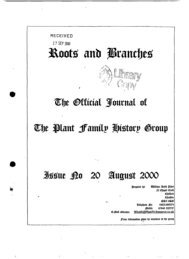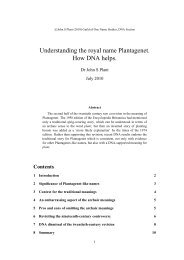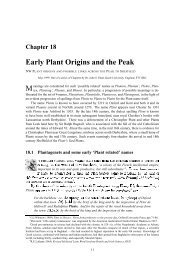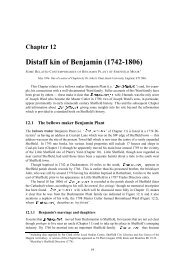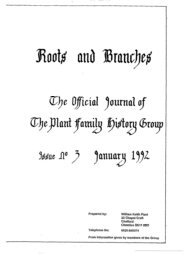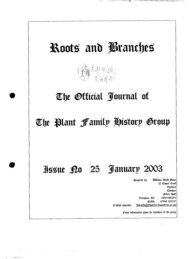Chapter 34 Austin Plant - Plant Family History Group
Chapter 34 Austin Plant - Plant Family History Group
Chapter 34 Austin Plant - Plant Family History Group
You also want an ePaper? Increase the reach of your titles
YUMPU automatically turns print PDFs into web optimized ePapers that Google loves.
On a possible connection to <strong>Plant</strong>agenet<br />
by Dr John S <strong>Plant</strong> (Member No 52) March 2007<br />
There has been much debate about a possible connection between the <strong>Plant</strong> and <strong>Plant</strong>agenet<br />
surnames. For example, an 1860 Surname Dictionary refers to an edition of the Leicester Mercury<br />
and states that <strong>Plant</strong> is a corruption of <strong>Plant</strong>agenet. In 1897, some further discussion appeared in<br />
Notes and Queries (Oxford University Press) [8th S., XII, Aug 28, ’97, p. 167]:<br />
PLANTAGENET. – Some time ago I read an account of a boy named <strong>Plant</strong> (residing<br />
in Warwickshire, I believe), whose grandfather had borne the royal name <strong>Plant</strong>agenet,<br />
but had changed it to <strong>Plant</strong>, thinking that the full name too grand for a poor man. The<br />
note proceeded to state that this boy, if Salic Law had been in force, would have been<br />
king of England. Can anyone tell me more of this, or inform me as to where I should<br />
obtain the note in question? ... PELOPS.<br />
There were replies [op. cit., Sept. 25, ’97, p. 258]:<br />
PLANTAGENET (8th S, xii. 167). – Some such note as this, of the name <strong>Plant</strong>agenet<br />
shortened to <strong>Plant</strong>, may be found in Burke’s ‘Vicissitudes of Families.’ But there<br />
is no kind of verification, and the statement that the holder of the name would be king<br />
by Salic law must be taken with very great caution. ... C.F.S. Warren, M.A., Longford,<br />
Coventry.<br />
The Rev Anthony Bathe wrote from Paull, Yorks, the account of the boy <strong>Plant</strong> that<br />
PELOPS enquires about. It appeared in one of the daily papers - the Standard, I think<br />
- and Mr Bathe mentioned that the boy at that time was living at Paull. – R.H., Ely.<br />
Subsequent Surname Dictionaries have offered different opinions for the meaning of <strong>Plant</strong>; and,<br />
my own opinion, having studied the matter for many years, is that any connection between the<br />
<strong>Plant</strong> and <strong>Plant</strong>agenet surnames is cultural rather than genetic. That is not to say that the embellished<br />
<strong>Plant</strong>agenet claim does not provide a tidy explanation of some details of the more recently<br />
established evidence:<br />
• there is an indication of illegitimacy in the <strong>Plant</strong> blazon;<br />
• the <strong>Plant</strong>-like name, <strong>Plant</strong>yn or <strong>Plant</strong>eng’, belonged to a servant of the noble <strong>Plant</strong>agenet<br />
descent which, like the place name, la <strong>Plant</strong>eland, can be related to de Warenne descendants<br />
of Geoffrey <strong>Plant</strong>egenest (ca.1250) to whom the name <strong>Plant</strong>e or Plont or <strong>Plant</strong> was nearby;<br />
and,<br />
• the spelling <strong>Plant</strong>t (a possible abbreviation) is found after the times of the royal House of York<br />
(for whom there is definite evidence that they used <strong>Plant</strong>agenet as a surname, ca.1450-1500),<br />
to which we can add that DNA evidence indicates that <strong>Plant</strong>t belongs to the same male-line<br />
family as <strong>Plant</strong>.<br />
However, on the other hand, it should be added that:<br />
• we can not simply presume that the name <strong>Plant</strong> referred to the generated (illegitimate) children<br />
of a generator of the realm; <strong>Plant</strong>egenest (or <strong>Plant</strong>agenet) can mean ‘a generator of the<br />
realm’, since Geoffrey <strong>Plant</strong>e Genest founded the Angevin Empire, and there is evidence in<br />
early English books to support such a meaning;<br />
• there were many others who could have been the forefather of the <strong>Plant</strong> offspring;<br />
• apart from a few references, such as ones to <strong>Plant</strong>egenest, <strong>Plant</strong>eng’ etc., it is not clear how<br />
much the <strong>Plant</strong>agenet name was in use when the <strong>Plant</strong> surname was first forming (ca.1250-<br />
1400); and,<br />
56



